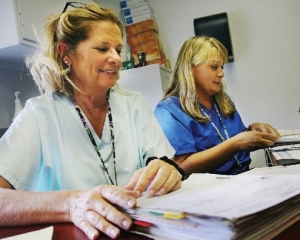Health Department trying new appointment procedure
By Phyllis Moore
Published in News on August 31, 2009 1:46 PM

News-Argus/MITCH LOEBER
Wayne County Health Department nurses Annette VonWald, left, and Sheila Warren work on patient records as they get ready to go to "open access appointment scheduling," effective Tuesday in the family planning and STD clinics.
The Wayne County Health Department is moving to a more efficient way of providing care in two of its clinics this week.
"Open access appointment scheduling" goes into effect Tuesday for family planning and sexually transmitted disease clinics.
The model will be an improved way to get faster care, with less wait time to be seen, said Evelyn Coley, director of nursing.
"The goal is to do a day's work today so that patients can either walk in and get appointments or schedule appointments today or the next day," she said. "We have done a lot of surveys, and in the feedback, wait time would always come up."
In the area of family planning, appointments have previously been set up three months in advance, she explained. Yet often, by the time the date arrives, the patient may have forgotten, changed her mind or is simply a no-show.
By offering faster turnaround time for appointments, the new system will not only accommodate patients but increase staff efficiency, Ms. Coley said. Employees are accountable for their schedules, so keeping a steady stream of slots filled will make good use of time, especially since the Health Department has gone to the four-day workweek.
"We think it's going to improve compliance with appointments," she said. "It's efficient in that the patient has an appointment with staff members versus block appointments. If you have a no-show on your appointment, you put someone else in the slot."
The model has already been proven to work. In 2007, the Health Department went to open access in its maternity clinic.
"It's actually cut the waiting time down in maternity in half," she said. "With this public access part, we also look at (and) try to reduce the chairs. We looked at the process and streamlined it."
Staffers in the maternity clinic have been pleased with the new system, Ms. Coley said.
"It's a more controlled work environment -- more teamwork, more efficient and you have got happier patients and happier staff," she said.
The STD clinic, formerly a walk-in, will also benefit from the change and pace the flow of patients.
"It was previously set up for patients to show up at certain hours and they could be seen. That didn't always work out well, though," Ms. Coley said. "One day you might have 12, the next 18. We're not going to have that walk-in for them. They'll be able to call for today or tomorrow. We'll have three nurses in that clinic. That will increase our capacity to see more patients and more family."
Explaining the open access appointment model, the nursing director called it an improved way to get care when it's needed.
Patients call 731-1005 to set up a visit. The goal is to provide an appointment that day or within one or two business days. The only other stipulation is to show up on time. If more than 15 minutes late, the patient will have the option to wait for the next available appointment or reschedule.
There are already patients on the books for the two clinics who will be seen during the transition period. Beyond that, the new system is expected to spread patient visits over a more comfortable schedule.
"The program managers will monitor the schedule to see where staff needs to be reallocated," Ms. Coley said. "If they have no appointments, they can do paperwork, data entry, schedule and set up clinics. It will also increase the time for phone calls. Family planning takes calls, pulls records, the nurse calls (patients) back. ... We should be able to manage phone calls and follow up a little bit better, too."
It may take some time until everything is in place, but the Health Department anticipates good outcomes from the change, Ms. Coley said.
